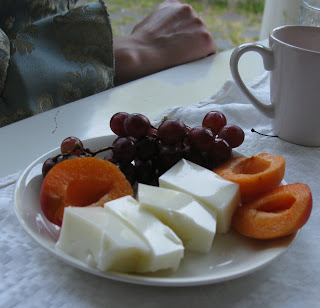As I've mentioned in some posts before, my usual method of finding something new to read is to wander around in a library and randomly pick up volumes that look interesting; so you could say that I rely on the judging-a-book-by-its-cover method. Of course this doesn't just mean choosing books which have eye-catching covers (although this also happens frequently); it can be the title, or the blurb, or the name of the writer (familiar or not) which attracts me enough to take the whole book home with me.
This method rarely fails, and I've discovered many of my favourite writers this way. The last gem which attracted my eye did so by its gorgeous green cover, which contrasted intriguingly with its title, The Yellow House. On closer inspection the work (written by an Irish-American called Patricia Falvey) turned out to be a story of a woman growing up in the trouble-ridden Northern Ireland around the turn of the 20th century. What hooked me about this book was, along with its glistening language, the sheer personal charm of its protagonist, Eileen O'Neill. Rarely have I come across such a self-assured, dynamic, and yet sensitive leading character, who remains thoroughly credible all through the text.
About the only scruple I had with The Yellow House was its somewhat predictably hurried happy ending. Yet the force of the narrative was such that I didn't find it very hard to accept this solution, and my sympathy for Eileen was so strong that I sincerely wished her well. Which is again quite rare in my reading experience.
And which is something I couldn't grant to the leading lady of another book I've just finished. This time it was the orange Penguin back which attracted my eye, along with the matter-of-fact title, Lady's Maid, by Margaret Forster. The name of the writer rang a bell, and as the book announced it told the story of the household of Elizabeth Barrett Browning, I couldn't put it back on the shelf with a good conscience.
Now, I'm a sucker for most things to do with Victorian England, and especially with its writers. I expected this book to open a new, edifying window into the lives of Elizabeth and Robert Browning, as well as providing some good page-turning narrative from the point of view of their maid, Wilson. I profess myself disappointed, however: all of the characters of the tome (over 500 pages of it) - including the protagonist - turned out to be rather flat, and move about in their period setting like so many paper dolls. Although the semi-fictional setting provides lots of interesting events, none of these really touch the reader - as they don't seem to touch the wooden Wilson or to give any real insight into her character. There are no real climaxes in the narrative; even the death of Elizabeth is rather an anti-climax, as it only releases her maid to a life of empty resignation.
Basically, the problem for me is that there are no likeable characters in the novel, or indeed any characters which arouse any strong emotions at all. Wilson, despite her efforts, never really learns to understand her own feelings, and thus also leaves the reader high and dry. Her mistress is a selfish invalid, and her husband only flits in the periphery of the story, in turns sympathetic or cold towards his wife's servant/friend. Wilson doesn't have real friends, and the numerous men she tries to love all turn out to be either complete bastards or just very very dull people.
Doing some post-reading research, I discovered that Wilson was also a real person, and that her life went on for decades after the end of the narrative of Lady's Maid. Forster, in her afterword, also acknowleges this, and flashes the possibility of a sequel. In my view, with some well-judged condensation, all of this material could have been included in Maid as it would have at least provided a more satisfactory ending.
All in all, when it comes to the Brownings, I much prefer
this version of their story.
Talking of women and fiction, in case you're wondering, the woman in the above picture is my paternal grandmother, Amanda, who died in 1963. As I never stood the remotest chance of meeting her, over the years I've created many versions of her story. The facts I possess are scanty, which gives me even more liberty to imagine what her personality, wishes, accomplishments were like - and whether we would have got along.
Perhaps it's for the best not to know - but that never stops the imagination.
Anyway, here's some very lovely music:


















































